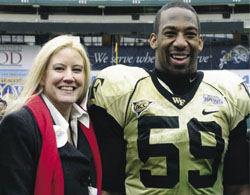Kicking Off a New Collegiate Contest

Marie Rudolph, MPA ’94, with linebacker Aaron Curry of Wake Forest University at the inaugural EagleBank Bowl on Dec. 20, 2008, in Washington, D.C. Ms. Rudolph helped bring the post-season college bowl to the nation’s capital.
Football fan Marie Rudolph, MPA ’94, thought the nation’s capital should host a post-season college bowl. Using skills she learned at GW and honed during her career in government and higher education, Ms. Rudolph put on her game face and decided to go for it.
Ms. Rudolph is co-founder and director of teams and special events for the EagleBank Bowl, which is playing its second annual game on Dec. 29 at RFK Stadium in Washington, D.C. The game features one of the U.S. service academies versus a team to be selected from the Atlantic Coast Conference.
“Sports is something I am very passionate about, and when we had the opportunity to take this idea and bring it to life, it was an opportunity I wanted to take full advantage of,” Ms. Rudolph says. As one of three full-time employees for the bowl, she is involved in all aspects of its administration, planning, and execution.
Ms. Rudolph earned her get-it-done attitude from her diverse career experience. After college, Ms. Rudolph moved to Washington, thinking law school was in her future. She worked on Capitol Hill and as a paralegal supervisor on civil litigation in the Department of Justice and the Department of the Navy, but ultimately called an audible away from law school and earned her master’s in public administration from GW in 1994.
For the next six years, she worked within the highest levels of the D.C. government, including as a City Council and Capitol Hill liaison for Washington, D.C., Mayor Anthony Williams. From there, Ms. Rudolph returned to GW as a staff member, rising to become director of government, international, and community relations. At GW, she oversaw federal government relations, including working with Capitol Hill and the GW alumni members of Congress to strengthen partnerships and build the GW brand. “The people you meet, the opportunities you can take advantage of living in this city are invaluable. It’s so important to stay connected with GW for so many reasons,” Ms. Rudolph says.
Working for and with both the D.C. and federal governments in areas such as finance, government relations, and marketing gave Ms. Rudolph the skills and contacts she would later call upon to do what had never been done before. “Every job I’ve had has put me in a position to succeed where I sit today,” she says.
While watching previews for the NCAA bowl games in December 2006 with Sean Metcalf, an acquaintance from the D.C. City Council, Ms. Rudolph wondered why Washington had never hosted a game. The opportunity was there. “We had as good a chance as anyone to pull it off,” she says.
Showcasing her “D.C. education,” Ms. Rudolph and Metcalf worked the town, securing RFK as a stadium, the ACC as a league annually committed to the game, ESPN as a TV partner, and the necessary financing. By April 2008, they were standing before an NCAA bowl committee of roughly two dozen university officials. They received approval later that month, giving them six months to plan and host a major collegiate bowl game. “It was surreal, a whirlwind,” Ms. Rudolph says. “We worked 24 hours a day, seven days a week. My BlackBerry was as important as oxygen, food, or water.” They pulled it off—with the help of city partner D.C. Sports and Entertainment Commission and title sponsor EagleBank.
“Teams having a great experience in our city is of paramount importance to me,” Ms. Rudolph says about the bowl. GW plays a vital part in that process, Ms. Rudolph explains. Last year, volunteers from GW’s sports management classes helped prepare the welcome reception for each team. This year, one of the classes will undertake a group ticket sales project. GW undergrads have interned with Ms. Rudolph, and one of last year’s graduate students is now Ms. Rudolph’s assistant. She says her friends and colleagues from GW continue to be essential to her professional and personal development. “My work and study at GW was extremely important based on the exposure it gave me. Relationships I made have opened a number of doors. It’s the caliber of people who go to school at GW, who work there, that makes it so special,” she says.
Of all that she has accomplished, Ms. Rudolph is particularly proud she has done it in such a largely male-dominated arena. “As a woman, this is particularly gratifying. College football is coached by men and played by men. If a young lady can look at my example and say, ‘She did it, why can’t I?’ then the accomplishment is even more gratifying,” Ms. Rudolph says. “The more examples we have of women succeeding in sports, the less likely young girls will feel shut out simply because of their gender.” Through her hard work and perseverance, Ms. Rudolph has also given them a playbook on how to use GW and D.C. to their full potentials.
—Adam Mimeles
